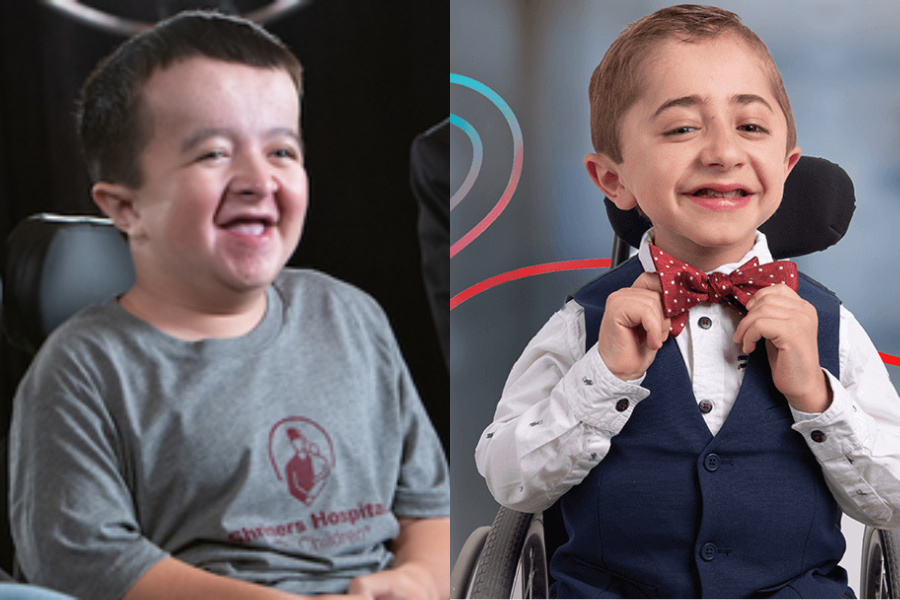Do alec and kaleb get paid for commercials: Alec Cabacungan and Kaleb-Wolf De Melo Torres have become staples in advertising due to their emotional appearances for Shriners Hospitals for Children commercials; garnering millions of hearts. But their journey raises an essential question – are Alec and Kaleb compensated? This blog dives deep into their roles within the advertising industry to understand their true compensations as well as any ramifications from these roles they fulfill.
Alec and Kaleb’s Background
Alec Cabacungan and Kaleb-Wolf De Melo Torres are not simply faces in commercials; they’re inspirational figures with incredible life stories. Both were born with Osteogenesis Imperfecta (commonly known as Brittle Bone Disease), an extremely rare condition which causes their bones to break easily, yet both became prominent ambassadors for Shriners Hospitals for Children despite these unique challenges.
Alec Cabacungan
Alec Cabacungan was born May 8, 2002, in Oak Park, Illinois and began attending Shriners Hospitals for Children as soon as two months old. Since then he has broken over 60 bones and undergone many surgeries; but still manages to be loved and loved up on television screens alike despite everything that’s happened to him. Finally in 2024 Alec graduated Northwestern University with a degree in sports broadcasting journalism – further solidifying him as an inspirational figure to many others.
Kaleb-Wolf De Melo Torres
Kaleb-Wolf De Melo Torres was born June 28, 2009, in Winnipeg, Manitoba, Canada and has been treated by Shriners since birth, where he has endured over 200 fractures and 11 operations despite remaining positive throughout. Kaleb’s engaging personality has earned him prominence within Shriners marketing initiatives.
Shriners Hospitals for Children
Shriners Hospitals for Children is an extensive network of non-profit pediatric medical facilities across the US that specialize in orthopedic conditions, spinal cord injuries and burns for children regardless of their families’ ability to pay; the organization relies heavily on fundraising campaigns as part of fulfilling its mission; Alec and Kaleb have played key roles in these campaigns to support Shriners’ goals.
Alec and Kaleb’s Roles
Alec and Kaleb serve as patient ambassadors, appearing in commercials and public service announcements to raise awareness and funds for Shriners Hospitals. These commercials aim to evoke emotions among viewers while emphasizing resilience and hope provided by Shriners to children with serious medical conditions; yet their participation prompts questions as to their compensation in these commercials?
Do Alec and Kaleb Get Paid for Commercials?
Yes. Both Alec and Kaleb receive compensation for their roles in commercials; however, details regarding their compensation packages have yet to be made public. It’s safe to assume their earnings include both upfront fees as well as royalties from the success of commercials they star in.
Understanding Commercial Compensation
Commercial compensation varies considerably in the advertising world depending upon factors like brand recognition and reach; role in the campaign; individual involvement etc. Here are the common forms of payment Alec and Kaleb could receive for their roles:
- Flat Fees: Actors appearing in commercials usually receive one-time payments known as flat fees that cover all aspects of their participation including shoot and promotional activities. Negotiations take place prior to filming the commercial, typically before any payment has been agreed on and completed.
- Royalty Payments: Sometimes actors receive royalties as ongoing compensation based on how their commercial performs; each time it airs they may receive a small payment and this form of compensation could prove particularly lucrative if its distribution and airtime frequency are significant.
- Usage Fees: Usage fees are additional payments made when commercials air across multiple regions or media platforms, in order to compensate actors and filmmakers for extending the reach and utilization of their work. These usage payments aim at compensating them accordingly.
- Performance Bonuses: Sometimes actors receive performance bonuses if their commercial exceeds certain performance metrics such as reaching high viewership numbers or creating significant engagement; such bonuses act as an incentive to ensure top-quality performances are given by actors.
As they have achieved such widespread fame and recognition, Alec and Kaleb may receive compensation that meets industry standards for high-profile commercial work. Their earnings from commercials may include:
- Negotiated Flat Fees: Given their prominence within Shriners campaigns, Alec and Kaleb likely negotiate substantial flat fees when appearing. Their appearance fees depend on factors like market value, commercial budget and level of involvement; since both men are integral parts of fundraising initiatives for Shriners it seems reasonable that their flat fees might fall on the higher end of this scale.
- Potential Royalty Earners: Because Shriners commercials are widely distributed during holiday fundraising drives, Alec and Kaleb may earn royalties. Royalty payments would provide ongoing income depending on how often their commercial is broadcast – for instance if used multiple times on national television or as part of an extensive digital campaign, royalties could substantially boost earnings.
- Usage Fees: Shriners Commercials with Alec and Kaleb may qualify for usage fees when used across platforms or regions, which will compensate them for increased exposure and use. Longer campaigns could make these usage fees an additional source of revenue.
- Performance Bonuses: Should the commercials achieve outstanding results, such as substantial donations or viral spreading, Alec and Kaleb could become eligible for performance-based bonuses – giving them incentive to continue working for the organization in question. These awards would serve to reward them for contributing their skills towards its success, incentivizing further contribution by rewarding for what has already been contributed towards its success and rewarding their contributions along the way.
Alec and Kaleb’s Work
While Alec and Kaleb may receive significant financial compensation from their commercial appearances, their wider impact of their work extends far beyond money alone. Their roles in commercials have enabled Shriners Hospitals for Children to raise millions in donations that continue providing essential medical care for countless young patients across America.
Career Advancement
Their commercial work has provided Alec and Kaleb with new opportunities in the entertainment industry. For Alec, who pursued his degree in sports broadcasting, these experiences may lead to roles on TV or media; Kaleb still in his teens stands to benefit as well – perhaps exploring media or public speaking fields down the line.
Public Perception
Their participation in Shriners campaigns has had a profound effect on Alec and Kaleb’s perception by society at large, shifting perception away from just seeing them as patients but more as advocates for children with disabilities and inspiring figures of hope and perseverance. Through social media they’ve built up quite the fan base that further solidifies their influence.
Industry Trends
Alec and Kaleb’s success as commercial advertising stars mirrors wider trends within the industry; where real, relatable figures are increasingly valued over celebrity endorsers. Their work shows the power of personal narratives in creating emotional connections with audiences – something expected to continue transforming the advertising landscape.
Challenges and Considerations
While Alec and Kaleb’s success cannot be denied, their journey has not come without challenges. Balancing public life roles with personal commitments like education and health needs demands careful management and support from everyone around them.
Balancing Work and Education
Alec and Kaleb must balance work with education as young actors. Alec has already completed his degree, while Kaleb, still attending school, must find ways to continue studying while participating in commercial shoots and public appearances – it is key that his long-term development receives an inclusive education experience.
Mental and Emotional Well-Being
Being exposed to public scrutiny, particularly for young individuals with medical conditions, can put immense stress on one’s mental and emotional well-being. Alec and Kaleb need strong support networks of family, healthcare providers and mental health specialists who will assist them as they face these difficulties head-on.
Open communication, regular counseling sessions and creating a nurturing environment are essential components to maintaining mental and emotional well-being in children and youth, both personally and for continued professional success. This support ensures their ongoing well-being as they embark upon professional endeavors.
Misconceptions and Criticisms
While Alec and Kaleb’s involvement with Shriners commercials has had positive outcomes, their appearances have drawn scrutiny and some critics claim the organization exploits children with disabilities to solicit donations for themselves; others may question if their compensation – given how important their participation has been in helping the organization thrive – is adequate.
Shriners Hospital Scandal
Shriners Hospitals has come under scrutiny for alleged exploiting children with disabilities to drive donations; critics contend this exploitative tactic raises ethical concerns regarding depictions of vulnerable individuals through marketing efforts.
Though these concerns are valid and warrant consideration, it should also be remembered that Alec and Kaleb’s participation is voluntary and compensated accordingly. Their stories are shared to raise awareness and funds for causes which directly benefit them and others like them; additionally, these commercials serve as powerful reminders about Shriners Hospital services that depend on public support to continue operating effectively.
Compensation Transparency
An additional criticism regarding Alec and Kaleb’s compensation stems from its lack of transparency. While we know they receive payments for commercial appearances, exact figures remain undisclosed leading to speculation as well as concerns that their pay is adequate compensation.
Entertainment industry practices dictate that talent contracts be kept confidential; however, due to Alec and Kaleb’s work being so public and having such an enormous effect, increasing transparency around their compensation could help mitigate concerns about exploitation while simultaneously acknowledging their efforts and contributions more adequately.
Future for Alec and Kaleb
Alec and Kaleb’s futures look bright as their careers continue to flourish and develop. Through working with Shriners Hospitals, they have already gained an opportunity to inspire others while advocating on behalf of children with special needs. No matter if they remain within entertainment, pursue further studies or discover other fields; either way they have made an impactful mark that has left a lasting legacy on those they encounter throughout their journeys.
Expanding Opportunities
Now that they have established public profiles, Alec and Kaleb can explore expanding their influence beyond commercials. They could explore various areas of media, entertainment and advocacy, building on their experiences to inspire even more people while potentially becoming ambassadors for other organizations or causes.
Ongoing Advocacy
Their advocacy work with Shriners Hospitals will likely continue, and they may become more involved in charitable activities and public speaking engagements. This will further amplify their impact on the lives of children facing similar challenges.
Conclusion
In summary, Alec Cabacungan and Kaleb-Wolf De Melo Torres are vital figures in advertising for Shriners Hospitals for Children, raising significant awareness and funds through their appearances. While they are indeed compensated for their roles, their contributions extend beyond mere financial gain. Their involvement highlights the intersection of personal resilience and professional success, influencing the advertising industry and beyond.
As Alec and Kaleb continue their journeys, they not only demonstrate the power of personal stories but also the importance of fair compensation and ethical practices in commercial advertising. Their roles serve as a powerful reminder of the impact that dedicated individuals can have on important causes, inspiring others to support and engage with philanthropic endeavors.

